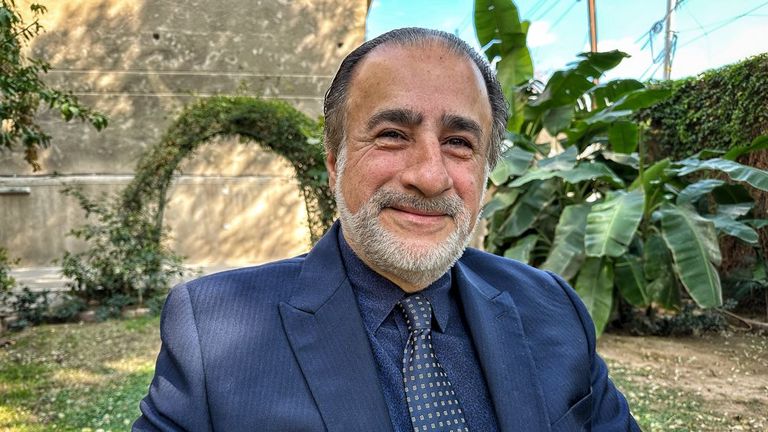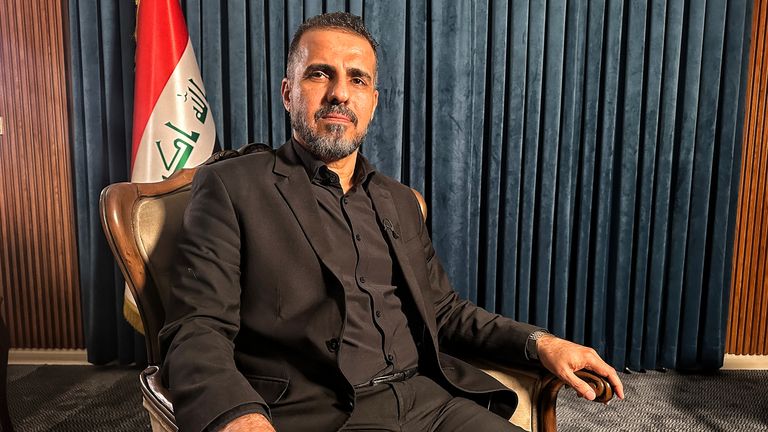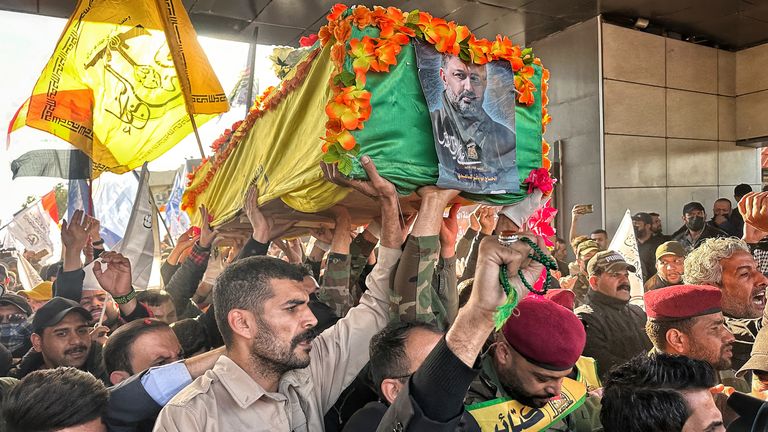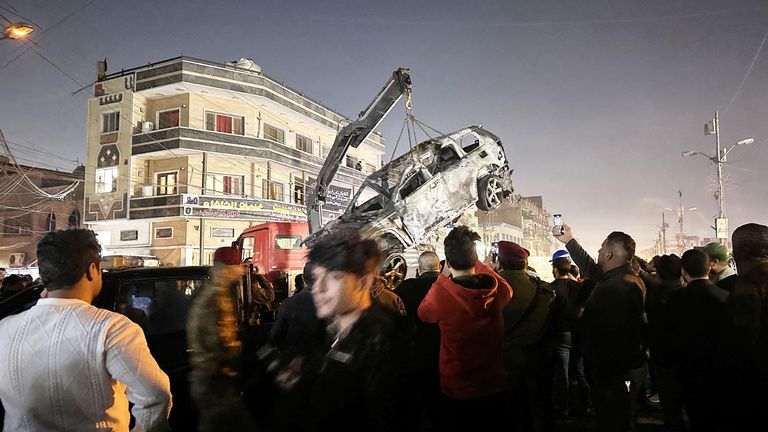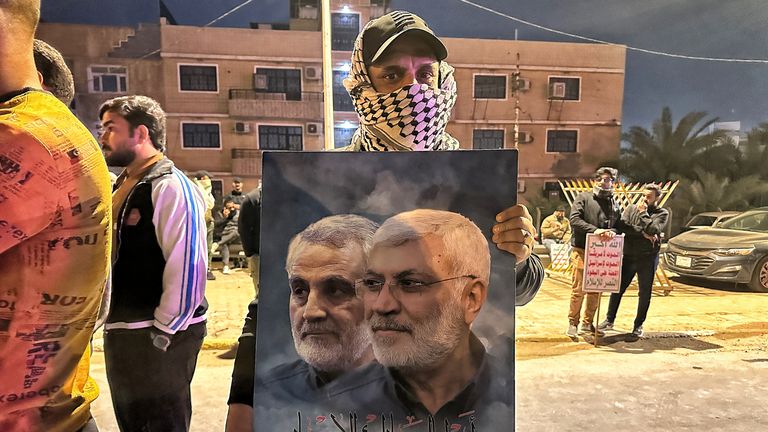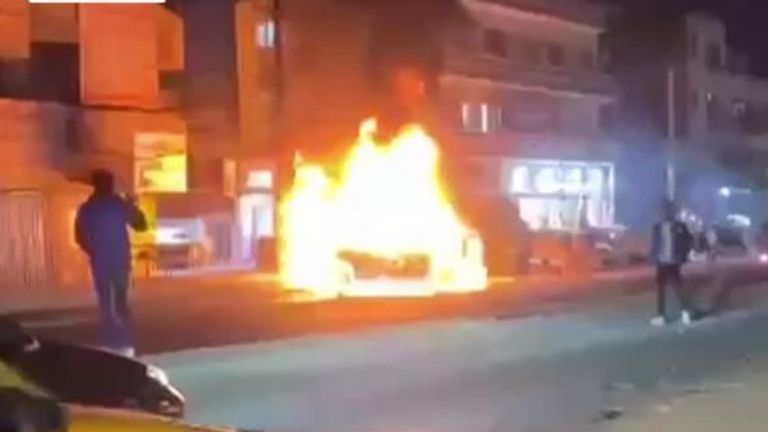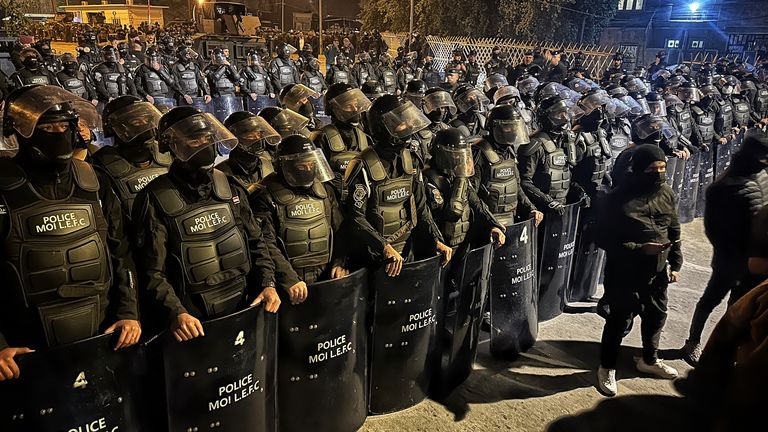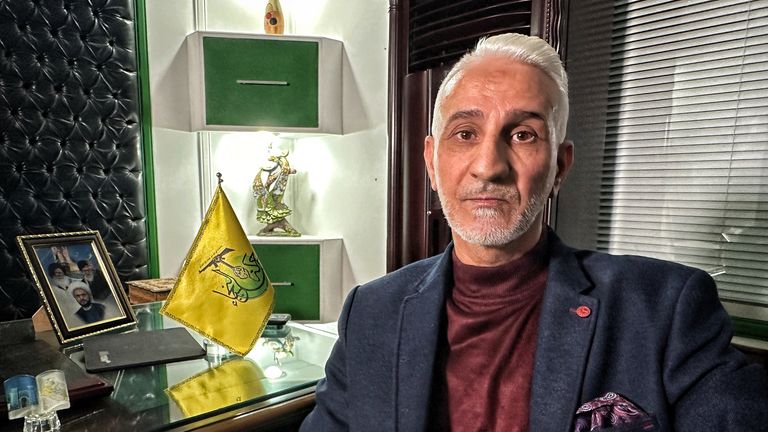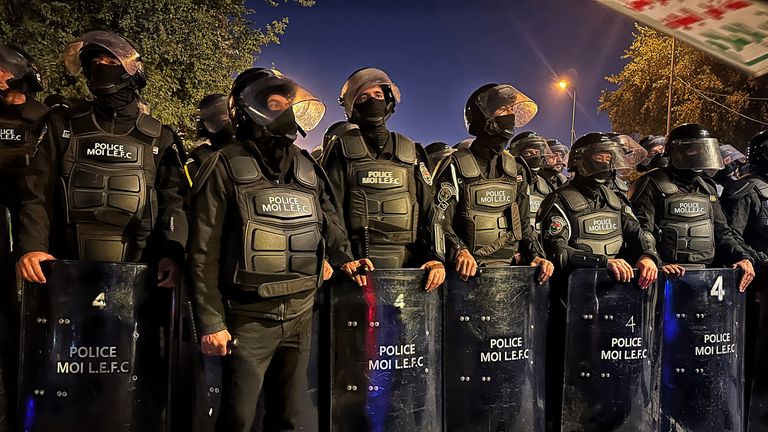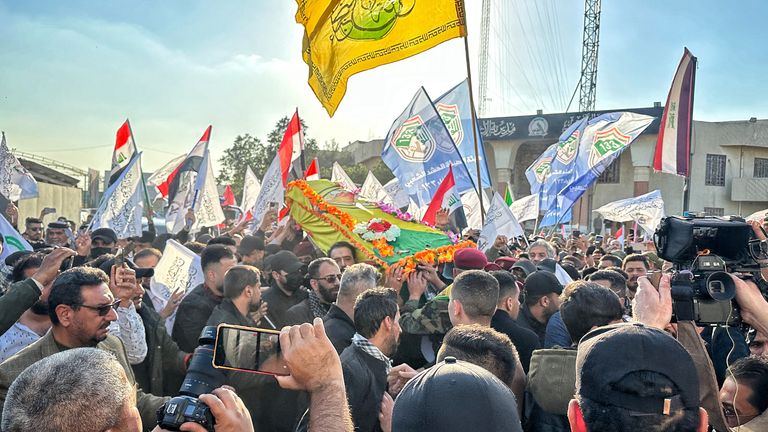Several of Iraq’s powerful armed groups have told Sky News in rare interviews that they will continue attacks against US forces based in Iraq and the region for what they see as America’s support of the Israeli bombardment of Gaza.
And one of Iraq’s leading MPs, who was put on the US terror sanctions list just a few weeks ago, accused America of deliberately trying to destabilise his country – telling us: “We don’t want war, but we are not afraid of it.”
The language and warnings from all those interviewed bodes very badly for the stability of both Iraq and the entire region.
The threats come as the UN envoy to Iraq described the rising tensions as a “critical juncture”.
They come after a spike in deadly tit-for-tat attacks between US forces and the Iraqi-based armed groups over the past fortnight.
It has contributed to mounting concern in Iraq and beyond that what’s happening in Gaza – which has already resulted in a violent spillover in the country and is affecting stability amongst its neighbours Yemen, Syria and Jordan – will lead to secondary all-out war.
The Iraqi prime minister’s adviser Farhad Alaaldin told Sky News from his office in Baghdad: “We don’t want Iraq to be an arena for other peoples’ conflict or settling scores on Iraqi soil.”
How the ‘Axis of Resistance’ is becoming harder to ignore
Iraq’s current situation is highly complex with a long history.
The three armed factions we spoke to in the Iraqi capital are part of the multinational Axis of Resistance, an informal political and military coalition in the region led by Iran, which has gained massive momentum since the 7 October Hamas attacks.
It is the first time this coalition of transnational militant extremist organisations has mobilised on multiple fronts – and it is having a violent, dramatic worldwide impact.
The Axis of Resistance, as the armed groups call themselves, has managed to coordinate attacks on Red Sea shipping by the Yemeni Houthis.
Follow latest: Israel warned of ‘serious repercussions’ as Rafah assault looms
Meanwhile, Lebanese Hezbollah fighters have launched strikes on northern Israel, pro-Syrian regime fighters are hitting US bases in Syria, and Iraq’s armed units are attacking American forces not just in Iraq but US bases in Jordan too.
The ability of these Axis of Resistance group to cause deaths, instability and economic ripples around the world is becoming more and more difficult to ignore.
And while the different fighting factions have particular national motives for creating disruption, they cite the war in Gaza and America’s support for Israel as the cohesive motive.
The Axis of Resistance clearly has military fighters, operations, an intelligence network and support in Iran, Iraq, Yemen, Lebanon and Syria.
Many in Western governments fear the resistance as a potent and dangerous force through which Iran can tackle America and Israel (and vice versa) without entering direct confrontation.
US accused of not respecting Iraqi law
The three armed groups in Iraq we sat down with are all designated by America as global terror groups.
The representatives we spoke to are from Harakat Hezbollah al Nujaba (HaN); the Kataib Sayyid al Shuhada (KSS) and the Asaib Ahl al Haq (AAH).
Under Iraqi laws, the armed units are not allowed to have elected political officials – but many of the country’s parliamentarians have sustained links with the armed factions which stretch back decades.
We also had a lengthy interview with Hussein Moanes, an MP and head of the Harakat Hoquq (Right Movement) viewed as the political wing of Kataib Hezbollah – one of the most powerful armed groups in Iraq, also part of the Axis of Resistance, and blamed by the US for the bulk of the recent attacks against its forces. Mr Moanes admits his long connection with Kataib Hezbollah.
“Everyone has history,” he told me. “And I honour that history.”
He denies he is a current member.
However, he was put on the US terror sanctions list just a few weeks ago and accused by American counter-terrorism officials for being involved in “gathering intelligence, kidnapping, even assassinating Iraqis identified as working with the US as well as planning terror attacks on civilian targets with the help of the IRGC-QF (Islamic Revolutionary Guard Corp Quds Forces”.
“That is a joke,” Mr Moanes told us from his office in the capital when asked about being on the terror sanctions list.
“It is complete nonsense, a lie. I am not a member of Kataib Hezbollah anymore. I didn’t kidnap any Iraqi or foreigner and the US should respect Iraqi laws and produce evidence. Would they take such a decision against anyone in the US without a proper trial? This is just an attempt to weaken the role of the Iraqi government and the laws of Iraq. I have nothing to fear.”
It all adds up to a potent toxic mix of circumstances and aggressive events now at risk of plunging Iraq into turmoil again – and rupturing the relationship between the two.
Read more:
Girl, 6, killed in Israeli strike
Anger rises in Baghdad after drone attack
Iraq’s significance in the region
Let’s examine in a bit more detail why what happens in Iraq is so important – and potentially dangerous.
The fighting groups are numerous, well-armed, financed and operating out of Iraq, a country which is viewed as one of America’s most important and strategic allies in the region.
But they all also have strong links with Iran.
US intelligence and government officials describe the armed groups as militias – Iranian proxies which are trained, funded, supplied and directed by Iran.
Both Iraq and Iran – and the various armed groups – have plenty of binding factors.
They are both Shia Muslim majority countries which also share a 900-mile border.
They are interlinked through centuries-old cultural, traditional and trading ties, as well as religion.
The two countries are significant trading partners and share water resources.
But Iran exploited the 2003 US-led invasion to oust the Iraqi President Saddam Hussein to full advantage.
Tens of thousands of Iraqi Shias driven out under Saddam Hussein’s leadership were given refuge in Iran before returning after the fall of the dictator.
Since the US invasion, Iran has been working hard on maintaining and growing its influence through every section of Iraqi society – governmental, legal sectors and militarily.
Kali Robinson from the US thinktank Council on Foreign Relations explained: “Two major interests drive Iran’s involvement. The first is preventing the government in Baghdad from again becoming hostile to Tehran as it was when Iraq invaded Iran and kicked off the countries’ 1980-88 war.
“Some one million Iranians and 250,000 to 500,000 Iraqis died in that conflict during which Iraq reportedly used chemical weapons.
“Iran’s second goal is driving US forces out of Iraq and the region at large.”
US and Iraqi forces fought together against IS
The armed groups, however, are also part of Iraq’s officially recognised Popular Mobilisation Forces (PMF), an umbrella military group which has about 40 or so fighting factions as part of it.
The PMF grew out of the anti-extremist fight launched against IS in 2014 when the extremists took over swathes of Iraq and Syria.
The US-headed international coalition battled alongside the Iraqi army and the PMF forces in the fight against IS.
Two years later in 2016, the PMF was recognised by the Iraqi government as an official unit and integrated into the national Iraqi armed forces under the same commander in chief, the prime minister.
One of the original leaders of the PMF was Abu Mahdi al Muhandis, who was killed in a US strike in Baghdad in 2020 while meeting the head of Iran’s Islamic Revolutionary Guard Corp’s Quds Forces, Major General Qassem Soleimani.
Not only did this double killing of two such significant figures send global shockwaves because of what was seen as the disregard for Iraq’s sovereignty, but it also very clearly demonstrated just how close the PMF is to Iran.
Mr Muhandis himself had admitted to substantial military links with Iran and publicly acknowledged the support, financing, and intelligence influence that Iran had inside the PMF.
Five years ago, he said: “I will not shy away from mentioning the support of the Islamic Republic of Iran in terms of weapons, advising and planning.”
He added that the joint fight against IS with the US had not resulted in the PMF getting many weapons from the coalition so the PMF would “not hesitate to mention Iranian support during the war on terror”.
As a state organ, the PMF also receives funding from the Iraqi government and by 2018, amid growing popularity because of their role in fighting IS, the armed groups in the PMF branched out into politics, getting into key government positions and securing multiple seats in the Iraqi parliament.
The US and Iraq’s complex relationship
The US-led and UK-backed invasion of Iraq in 2003, which saw the toppling of President Hussein, led to widespread anti-US sentiment. The US combat forces left the country in 2011 only to return in 2014 to help in the fight against IS.
The joint response against IS appeared to improve political relations between the two countries so by June 2022, the US State Department was calling Iraq a “strategic key partner”.
There are still around 2,500 US troops currently stationed in Iraq because of the threat of IS returning.
But the recent US attacks on Iraqi soil have killed popular commanders who had substantial support, leading to a renewed clamour for US troops to leave the country.
The prime minister’s office and the PMF have all stated Iraqis can handle the IS security threat themselves – and condemned the US attacks, saying they will hasten the departure of US troops from Iraq.
The effect of the war in Gaza
The war in Gaza has undoubtedly had a huge knock-on regional effect and is threatening the crucial relationship between the US, Iraq and its neighbours.
Not only is Iraq one of the largest oil producers in the world and therefore important for global economic reasons, it’s also viewed by American intelligence as a critical buffer against a hostile Iran.
But Iraq now seems more than ever the battleground for what appears to be a proxy conflict, really between Iran and America.
The three armed groups we spoke to all declared their two main priorities to be achieving a ceasefire in Gaza and the removal of US troops from Iraq soil.
They attempted to justify the attacks on US troops because of America’s support for the Israeli bombing in Gaza – and the allegiance with the Palestinian cause has led to support amongst Iraqi civilians too.
The key question is how much control does the Iraqi government have over the PMF and the multiple armed groups which form it and operate on its land?
And for that matter how much control or influence does Iran have on events in Iraq?
During our interviews, the three groups we spoke to all repeatedly said they were independent; made their own decisions regardless of the desires of Iran and insisted they were separate.
They all took great exception to being described as “militia” and insisted they were part of the recognised, legitimate Iraqi national forces.
But the US firmly believes the claims of independence from Iran are untrue – and the armed groups frequently defy the Iraqi authorities.
At least one of the groups is blamed by Washington for an attempted assassination attempt on Iraq’s previous Prime Minister Mustafa al Kadhimi in November 2021.
America seen to be taking a high-risk gamble
Sky News interviewed the three spokesmen at a crucial point of the most recent military escalation: in the week of a string of US-Iraq tit-for-tat strikes across Iraq, Syria and Jordan. US forces in Iraq and Syria have been hit by a slew of mainly rocket attacks from the Axis of Resistance – some 165 since the 7 October Hamas attacks.
Despite many warnings to the Iraqi government to reign in its armed groups, the turning point came when a drone strike was mounted against a US base in Jordan at the end of January that killed three American soldiers.
The Iraqi-based Kataib Hezbollah was blamed by America. US President Joe Biden vowed to retaliate hard to protect American citizens in the region.
The retaliation was heavily telegraphed for five days but the revenge came first in a wave of 85 strikes on targets in Iraq and Syria on a single night less than a week ago.
Iraqi officials objected immediately – saying Iraqi civilians were among the dead and injured and America had violated Iraq’s sovereignty.
Many saw that night’s attacks on Iraqi soil by one of the country’s important allies as a high-risk gamble.
With Iraqi figurehead leaders like the prime minister and president apparently unable to stop the repeated attacks against US bases in Iraq and Syria, America appears to have rolled the dice and opted for going over the heads of its political and military partners.
And the US president insisted then that the US attacks were just the beginning.
The second came days later – and it is potentially the most relationship-rupturing attack, with a direct hit in the capital, Baghdad against a commander of Kataib Hezbollah.
The day before, the Iraqi prime minister’s office had been busy briefing reporters (including myself) that a “truce” had been agreed with the armed groups, in particular Kataib Hezbollah, to halt their strikes against US forces.
The pause in hostilities, according to the Iraqi prime minister and his office, was to allow the Israeli-Hamas ceasefire negotiations to continue – and to press ahead with Iraqi and US discussions on the withdrawal of US troops from the country.
In all likelihood though, it was also an attempt to prevent any more US strikes on Iraqi territory.
If that was an intended tactic, it failed.
The following day, US Central Command admitted killing a senior Kataib Hezbollah leader who the Americans said was responsible for “directly planning and participating in attacks on US forces in the region”.
The death of the commander, named as Abu Bakr al Saidi, drew hundreds of furious mourners to his funeral ceremony in Baghdad on Thursday 8 February, and prompted a further spray of angry threats from all of the armed groups who vowed revenge – and insisted this would hasten the exit of US forces from Iraqi soil.
“It is certain that combat operations and resistance operations will continue until the American forces leave,” Hussein al Moussawi, spokesman from Harakat Hezbollah al Nujaba, told us in our interview.
He went on: “If the United States of America stops supporting Israel, we will stop supporting Palestine, and the equation is very clear. “
“The resistance today has the ability to reach the furthest extent.
“We have shown the Israelis over the past days that we were able to reach the furthest extent with our weapons.
“We reached Eilat, reached deep into Palestinian territory (sic), and hit many large targets. Therefore, Israel knows very well that the resistance is capable of reaching very far. It has the capacity and ability to reach specific targets, and it has the ability to reach targets deep inside Israel – or anywhere else.”
He emphasised the entire existence of the resistance rests on America exiting the region.
“‘The resistance is linked to this decision,” he said.
“And if the United States of America leaves today, there will be no resistance. If they leave after a year, the resistance will continue, so the survival of the Americans is linked to the survival of the resistance.”
What happens now?
The US killing, so publicly in the capital, is embarrassing for the Iraqi authorities.
The commander was apparently travelling in a PMF government car.
The prime minister, president and the armed forces all condemned what they called the blatant disregard for Iraq’s sovereignty.
Major General Tahsin al Khafaji, spokesperson for the Iraqi Joint Operations Command, said the fresh US “aggression” will “undermine all understandings” referring to the renewed talks between the US and Iraq over the withdrawal of US troops from Iraq.
“We also hold the American side and the coalition forces responsible for the repercussions of these dangerous actions that threaten the security and safety of the country and clearly undermine all talks that take place between the two sides,” Major General Tahsin added.
“This targeting is a clear aggression and violation of Iraqi sovereignty, dragging the region into dangerous repercussions.”
Mr Moanes, the MP from the Harakat Hoquq political party, had just returned with his young sons from paying his final respects at the funeral of the Kataib Hezbollah commander when we saw him.
He too denounced the US attack against his former colleague – and is also a fervent believer that US troops need to leave Iraq.
“The US troops are the cause of instability in Iraq,” he explained.
“The fear is coming from the American existence and actions in Iraq. They have just put Fly Baghdad, an airline operator accused of funnelling money from Iran to the armed units, on the terror sanctions list too – alongside Mr Moanes himself and two other individuals which the US accuses of being linked with terror groups.
“Now any foreign investor fears also being put on a US sanctions list,” Mr Moanes said.
“And imposing sanctions on political personalities also makes investors nervous.”
Referring to the presence of US troops in Iraq, he said: “The resistance to any occupier is basic to all human beings.”
Pointing to his sons sitting nearby, he added: “What we want now and what I care about is making the country stable and secure for my sons.”
“As Iraqis we want to make the decisions about our country ourselves.”
When I asked several times whether he saw the attacks against US forces as a legitimate way of persuading the US forces to withdraw, he went on: “We don’t want war but we are not afraid of it.”
Mr Moanes also said that “part of preserving the country is liberating the country and removing the occupier”.
He continued: “Therefore, we’re keen to get the Americans out through diplomatic means, but when all diplomatic means are exhausted, let us be frank with ourselves, we will find other ways.”
Mr Moanes confirmed that this meant military action against “the occupation” – referring to America.
